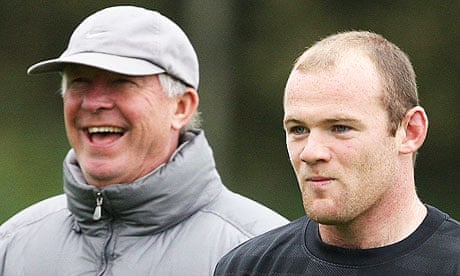Sir Alex Ferguson has given a tantalising glimpse of what might have been after revealing he turned down the chance to become England's manager on two separate occasions because he regarded it as a "poisoned chalice" and a "terrible job".
Ferguson, the most successful manager in the history of English football, said he was not tempted to leave Manchester United on either occasion, and he pointed out there would have been a "tremendous handicap" for a Scot taking a job that attracts such fierce media coverage.
The 68-year-old did not clarify when the approaches were made, although the Guardian understands he was the Football Association's first choice to replace Terry Venables in 1996 and then to succeed Glenn Hoddle before Kevin Keegan's appointment in 1999.
"I was offered the chance to manage the England team on a couple of occasions but, of course, it was just out of the question," he said. "It's a poisoned chalice anyway – I think it's a terrible job – plus the fact that I would have had a tremendous handicap being Scottish; no matter which way you look it, that's important."
Ferguson does not mention either offer in his autobiography, released in 2000, and he made it clear the conversations were brief. On the second occasion United's directors are believed to have given the FA permission to speak to Ferguson, but he was in the process of building the team that won the treble of Champions League, Premier League and FA Cup and did not want to subject himself to the same media intensity that had cost Hoddle his job and previously caused so much distress for Sir Bobby Robson and Graham Taylor.
The revelation will disappoint many England supporters, given Ferguson's status in the game – he has won 26 trophies, including the Champions League twice, since taking over at Old Trafford in November 1986 – and particularly after England's dismal performance in the World Cup. Ferguson, however, believes Fabio Capello was handicapped by England's players being out of condition in South Africa, and he thinks that will always be the case while there is no winter break in the Premier League. "The English season is exhausting," he said. "Look at December, for instance, when we play eight or nine games even though it's the worst time of the year for the pitches and the weather.
"In the second half of the season you then find lots of players are carrying little strains and pulls, but because of the importance of the games they keep on playing, and when they get to the end of the season and there's an important tournament such as the World Cup they're not 100%. They can't be because they need that rest factor to bring the energy back into their system."
Wayne Rooney, carrying an ankle injury, was one of the players to suffer, and Ferguson believes the pressure got to the forward. "It was built up in the media that it was going to be his tournament, but don't forget Wayne has not got great experience of playing in World Cups," he said. "It was the expectation. All the main players for whom the expectations were high had bad tournaments – [Lionel] Messi, [Cristiano] Ronaldo, too."
Of Ronaldo, he said: "It's difficult to say why. I spoke to [the Portugal coach] Carlos Queiroz after the tournament and he was as baffled as anyone."
Ferguson thinks it was a "disappointing" World Cup and that France's performances were "terrible", but he sympathised with Patrice Evra for his role in the mutiny of Raymond Domenech's players. "It was a team decision, but the fact he was captain meant he was put forward as the team's spokesman. They made a decision they all regret now, a terrible decision, but it wasn't an individual, it was a collective decision that he, as captain, took to the coach. Since then the rebound has been on his shoulders and that's disappointing."
Ferguson expects Fifa to bring in goalline technology after Frank Lampard's disallowed "goal" for England against Germany – "It will happen, absolutely," he said – and he sympathised with Howard Webb, who showed 14 yellow cards and one red in the final. "He was given an impossible task with the behaviour of the players. I think it got to the stage in the first half that showing a red card would have put him under pressure, criticism-wise.
"A World Cup final, having a player sent off, it's not the done thing and you don't want to see that. The public doesn't want to see that, the spectators who have gone to the game don't want to see that, and he was left in that position.
"There was no way out for him. If he had sent a player off, he would have faced criticism. If he didn't send a player off, he would get criticism. I think at half-time he realised that, and in the second half, his momentum got less and less."
